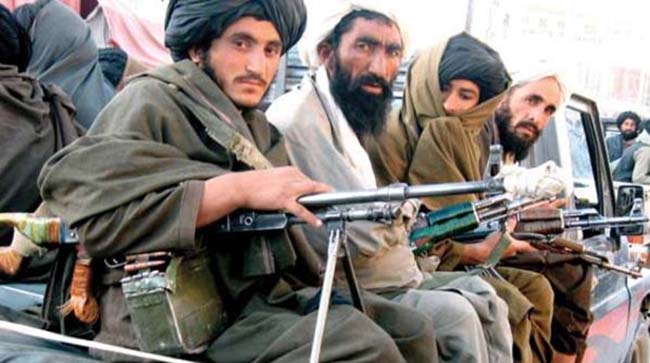The political conflict between Afghanistan and the Taliban elements stems from ideological differences. The Taliban’s militant group has been radicalized and fed not to negotiate but to engage in violence and bloodshed. The group was established in a hotbed of terror under fundamental interpretations of religion either to impose their warp mind on people or to shed their blood without an iota of concern. On the other hand, however, Afghan government insists on the Taliban to resume reconciliation process and give up militancy. The government’s tireless struggles yet to convince militants to hold talks.
Peace talk, as it was proved abortive, has been one of the hot issues for a long time. The four-nation group, which consists of Afghanistan, Pakistan, China and the United States, held many sessions without the Taliban’s presence to bring them to the negotiating table. Despite this fact, the Taliban have launched “Omari Operation” in 2016 and refuse resuming peace talks. Pakistan failed to use “leverage” properly to convince the militants to sit around the negotiating table. Similarly, China’s role was not constructive enough, as Afghans expected to be, in spite of spearheading the Quadrilateral Coordination Group (QCG). Jayant Prasad, the Indian’s ex-ambassador in Afghanistan, quoted China that Pakistan gave sacrifices in counter-insurgency and has close relations with China, it was said in response to the question, in an informal talk, that why China does not nudge Pakistan to convince the Taliban to hold negotiation.
Afghanistan’s demands from Pakistan were very direct. In a trip to Pakistan in 2015, Afghan President Muhammad Ashraf Ghani expressed the demands clearly: Pakistan would have to prevent the Taliban from spring offensive in 2015, Operate against the Heqqani network and bring the Taliban to negotiating table. To the Afghans’ unmitigated chagrin, none of the demands were met. The Taliban inflicted heavy casualties on Afghan nation in 2015 and captured the Kunduz province in late September and attacked the Afghan Parliament in June. Moreover, they captured Sangin district and took large toll of Afghan soldiers. Moreover, Haqqani network was behind many terrorist attacks not only in Afghanistan but also in Pakistan and a wide operation against this terrorist network could alleviate terrorism both inside and out of the border. In terms of peace talks, Pakistan committed to nudge the Taliban to hold talks but the commitment was not fulfilled so far.
Prasad, whom I had a meeting with few days ago, said that China is involved in Afghanistan for two reasons. First, China has political interests in the country and second, it will seek to prevent from the infiltration of terrorism in its soil. He stated that Afghanistan would better strengthen its constitution and usher in capacity building across the country rather than waiting for other countries to bring peace and security in this country. Indeed, an “Afghan-led” and “Afghan-owned” peace talk is the desire of Afghan officials on the condition that the neighboring countries play their constructive role in this regard.
The burgeoning democracy has encountered great barriers in the country and terrorism is a serious threat to it. The heavy casualties and war and violence going on across the country are a slap on the face of democracy. In other words, people fall prey to insurgency and their rights and freedoms are largely violated despite presidential and provincial elections and approval of constitution – which are significant elements of democracy. Moreover, there is a gap between state and nation and the government yet to gain the citizens’ trust. The government will have to focus on the country’s democratization and make efforts to protect the rights and liberty of every citizen. The citizens’ vote should secure their life and freedoms, mainly the freedoms of thoughts and expressions. Hence, democratizing all aspects of social life should be the top priority for the government so as to gain the public trust and nourish the true spirit of democracy in the country.
Moreover, the transparency in election is highly crucial in a democratic system and gaining the public trust. The government has to initiate issuing electrical identity cards, which was delayed for mysterious reason, to ensure a transparent election and remove the barriers lying ahead of democracy. In a nutshell, a transparent electoral system will be highly helpful to a democratic administration and electrical IDs are constructive in this regard and in strengthening security across the country. So, besides focusing on peace process, these are the necessary measures to be taken to develop security.
Since peace talks were the last gleam of hope for Afghan nation, the neighboring countries and members of QCG will have to play their role in bringing peace in Afghanistan and break the stalemate by using their influence. It should be noted that a violent-free and democratic Afghanistan will be helpful for the neighboring countries too. Currently, Afghanistan is wrestling with the Taliban’s Omari Operation and the nation will sustain great loss this year the same as 2015 despite seeking talks tirelessly.
It is still time for neighboring countries to prevent Taliban’s Omari Operation and support democracy in Afghanistan. Afghan government should also consider holding talks with more flexible group – which can bury the ideological differences and recognize the legitimacy of the government – and persisting on talks with the same radical group/groups will never come to fruition.
Home » Opinion » The Stalemate of Peace Talks – A Threat to Democracy
The Stalemate of Peace Talks – A Threat to Democracy
| Hujjatullah Zia

